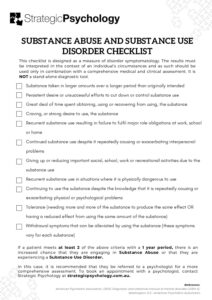
SUBSTANCE-ABUSE-AND-SUBSTANCE-USE-DISORDER-CHECKLIST
462 KB
This checklist is designed as a measure of disorder symptomatology. The results must be interpreted in the context of an individual’s circumstances and as such should be used only in combination with a comprehensive medical and clinical assessment. It is NOT a stand-alone diagnostic tool.
Substance taken in larger amounts over a longer period than originally intended
Persistent desire or unsuccessful efforts to cut down or control substance use
Great deal of time spent obtaining, using or recovering from using, the substance
Craving, or strong desire to use, the substance
Recurrent substance use resulting in failure to fulfil major role obligations at work, school or home
Continued substance use despite it repeatedly causing or exacerbating interpersonal problems
Giving up or reducing important social, school, work or recreational activities due to the substance use
Recurrent substance use in situations where it is physically dangerous to use
Continuing to use the substance despite the knowledge that it is repeatedly causing or exacerbating physical or psychological problems
Tolerance (needing more and more of the substance to produce the same effect OR having a reduced effect from using the same amount of the substance)
Withdrawal symptoms that can be alleviated by using the substance (these symptoms vary for each substance)
If a patient meets at least 2 of the above criteria with a 1 year period, there is an increased chance that they are engaging in Substance Abuse or that they are experiencing a Substance Use Disorder.
In this case, it is recommended that they be referred to a psychologist for a more comprehensive assessment. To book an appointment with a psychologist, contact Strategic Psychology on (02) 6262 6157 or email support@strategicpsychology.com.au.
Reference: American Psychiatric Association. (2013). Diagnostic and statistical manual of mental disorders (DSM-5). Washington, D.C.: American Psychiatric Association.
